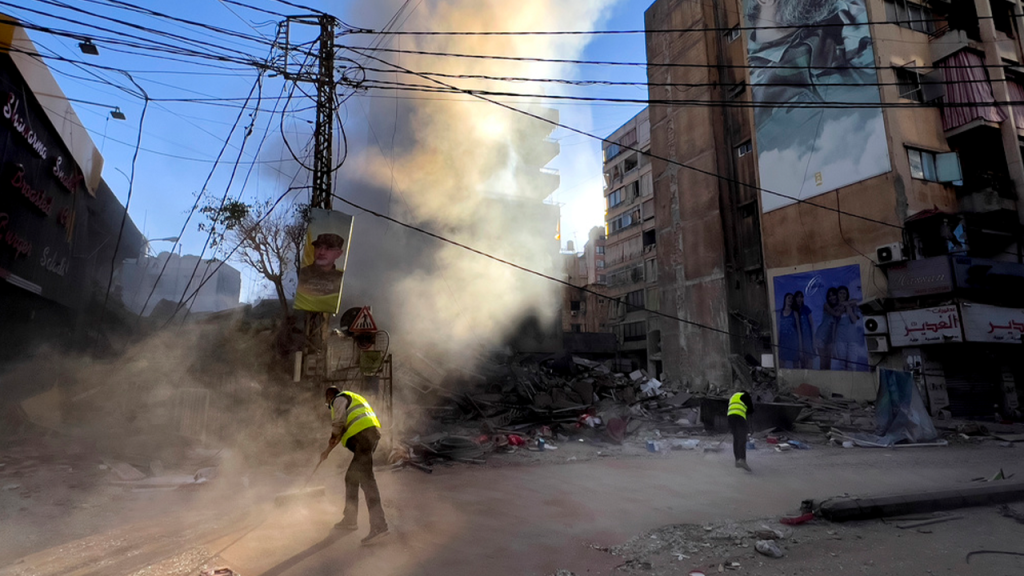The Israeli Defense Forces conducted targeted airstrikes against multiple branches of Al-Qard Al-Hassan, a Hezbollah-run financial institution in Lebanon, believed to be funding terror operations. The IDF stated that Hezbollah uses the institution to store hundreds of millions of dollars for financing its terrorist activities against Israel. Israeli airstrikes targeted branches across southern Lebanon and in Beirut, giving evacuation warnings ahead of the strikes to minimize civilian casualties. The IDF emphasized that the institution directly funds Hezbollah’s terror activities, including purchasing weapons and paying operatives in its military wing.
Amid escalating tensions, the Israeli government announced the airstrikes on Al-Qard Al-Hassan a day after U.S. Defense Secretary Lloyd Austin expressed concerns about civilian casualties in Lebanon during the Israel-Hezbollah conflict. The U.S. urged Israel to scale back some strikes, particularly in and around Beirut. Iran, a key supporter of Hezbollah, was also implicated in the conflict, with reports of an unauthorized release of classified documents revealing Israel’s military movements in response to Iran’s ballistic missile attack on October 1. Israel’s response included targeting Prime Minister Benjamin Netanyahu’s house with a drone, although there were no casualties reported.
Al-Qard Al-Hassan, operating over 30 branches across Lebanon, reportedly evacuated all its branches and relocated deposits, including gold, to safe areas following Israel’s announcement of the airstrikes. The IDF statement underscored that the funds stored in the institution were used by Hezbollah for terrorist activities, emphasizing the organization’s extensive financial resources. Israel’s military actions aimed to disrupt Hezbollah’s financial operations and limit its capacity to finance terror activities against Israel, targeting multiple locations associated with the terrorist group’s financial network.
The airstrikes in Lebanon were part of Israel’s ongoing efforts to counter Hezbollah’s threats and degrade its ability to carry out attacks against Israel. Israel’s military actions were based on intelligence-based targeting of facilities and sites used by Hezbollah to finance its terrorist activities. The strikes were conducted deep within Lebanese territory, aiming to disrupt Hezbollah’s financial infrastructure and capabilities. Despite the warnings issued by Israel ahead of the airstrikes, there were no reports of casualties, highlighting efforts to minimize harm to civilians while targeting terrorist assets.
Israel’s military operations against Hezbollah’s financial infrastructure reflect the ongoing conflict in the region and the complex dynamics involving various actors, including Iran’s support for Hezbollah. The unauthorized release of classified documents indicating Israel’s military responses to Iran’s actions added another layer of tension to the situation. As Israel grapples with escalating threats from Hezbollah and other terrorist groups, its military continues to respond to potential threats and take proactive measures to safeguard its security and deter attacks. The airstrikes on Al-Qard Al-Hassan underscored Israel’s determination to disrupt terrorist financing networks and prevent Hezbollah from further endangering Israel’s security and stability.
The airstrikes on Hezbollah-linked financial institutions in Lebanon are part of Israel’s broader strategy to counter threats from terrorist organizations and prevent attacks on its territory. The actions against Al-Qard Al-Hassan, a key funding source for Hezbollah, aimed to disrupt the terrorist group’s financial operations and limit its ability to carry out attacks against Israel. Israel’s military actions were based on intelligence targeting and aimed to minimize civilian casualties, reflecting efforts to deter terrorism while safeguarding innocent lives. The ongoing conflict in the region, involving multiple actors and complex dynamics, underscores the challenges Israel faces in defending its security and countering terrorist threats.


